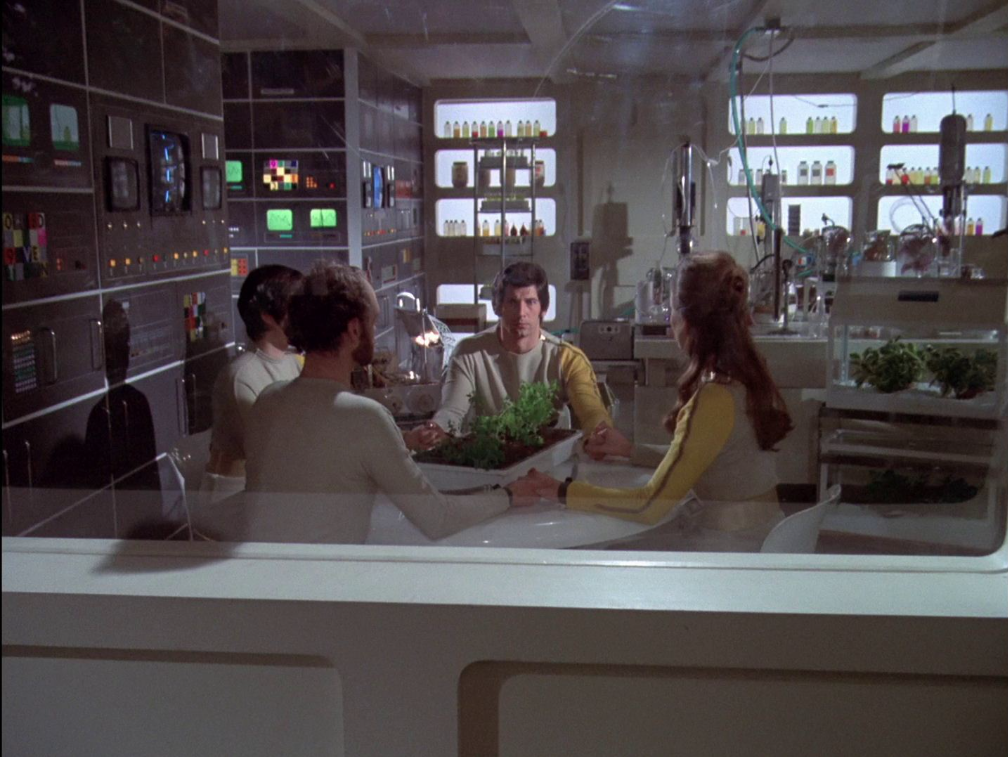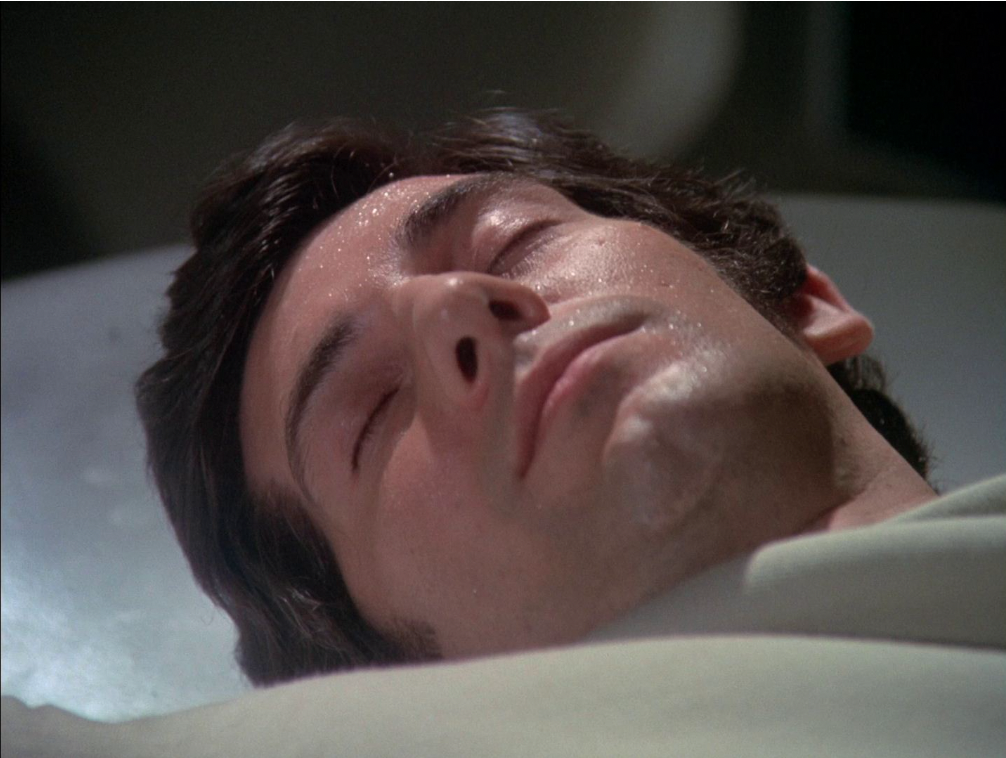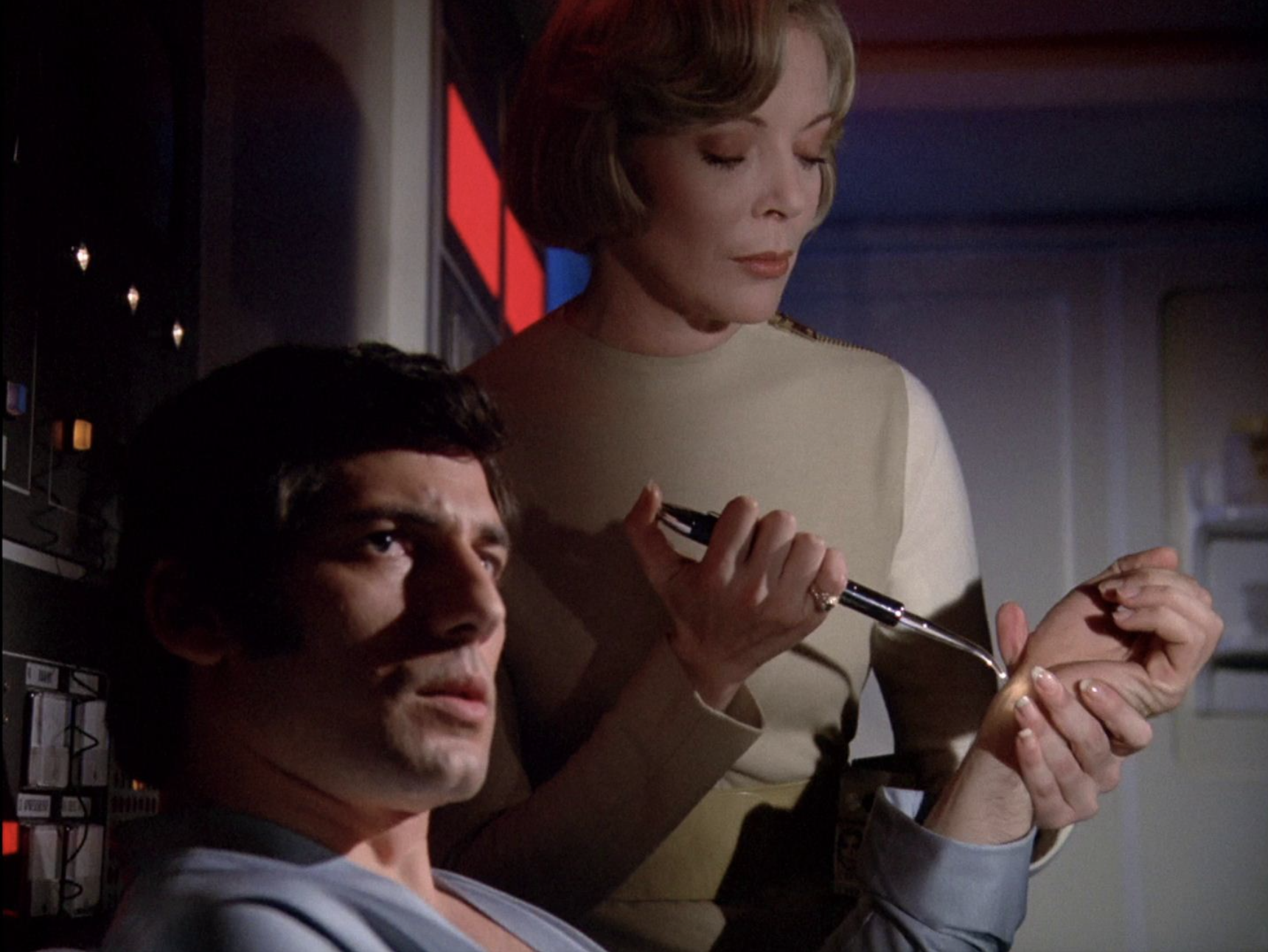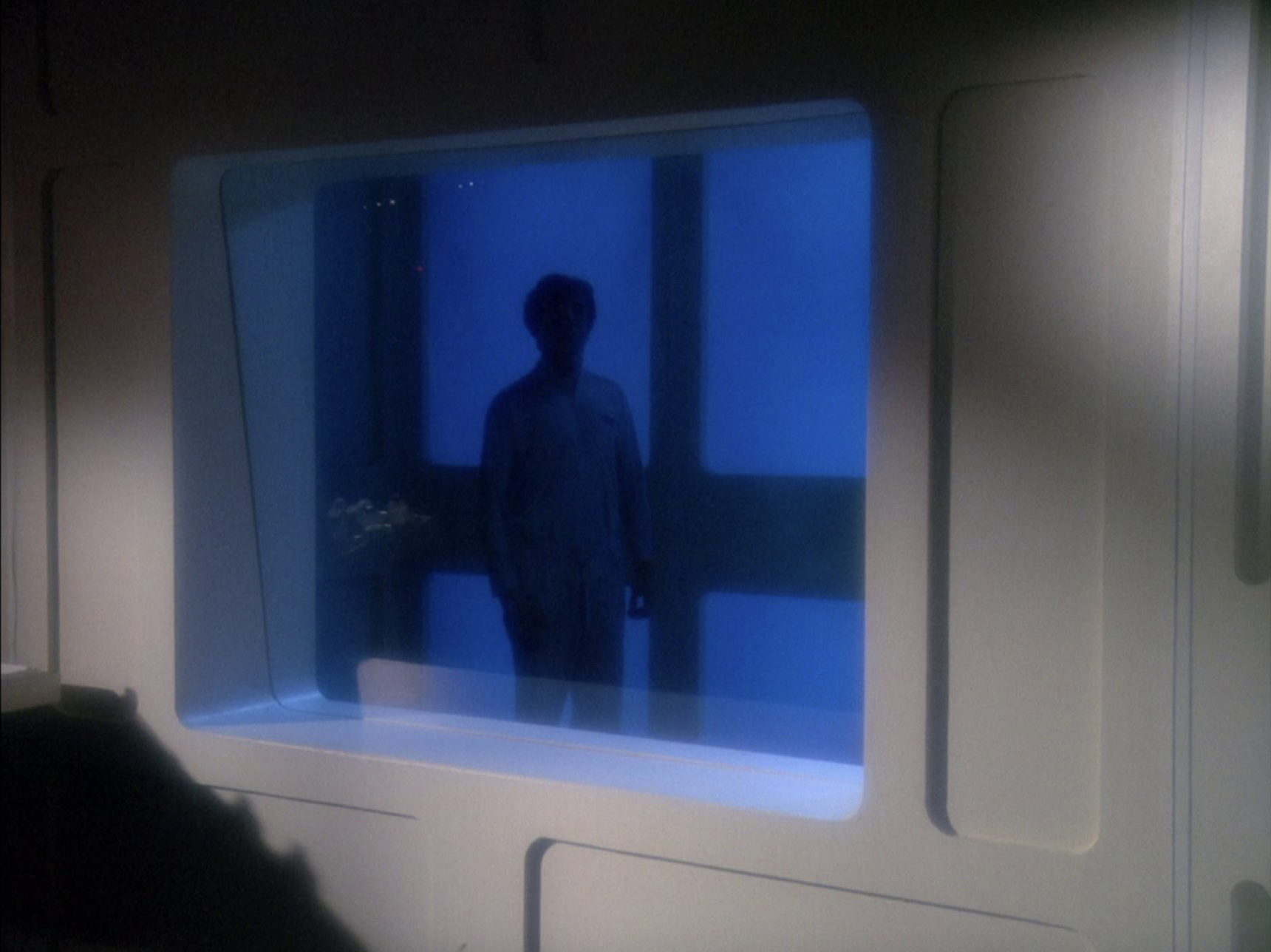One of the most complex of Space: 1999’s 48 episodes, ‘The Troubled Spirit’ (S1, Ep19) mixes psychology, parapsychology, and good old-fashioned spiritualism. It’s both a ghost story and murder mystery set in outer space, only not so much a whodunit as a ‘howdunit.’ Like the best science fiction, it raises more questions than it answers or, as Dr. Helena Russell (Barbara Bain) put its at the end, “Life and death … still the greatest mysteries.” Showrunner Johnny Byrne, as though realizing he had swung and not quite connected with those imponderables in ‘End of Eternity’ (S1, Ep12), has another crack at them in this installment.
‘The Troubled Spirit’ unquestionably has the series’ best “cold open.” The Alphans are enjoying some unwonted downtime, attending a recital of electronic-sitar music. Sandra Benes (Zienia Merton) and David Kono (Clifton James) are grooving to it, Alan Carter (Nick Tate) is ‘manspreading,’ Dr. Russell and John Koenig (Martin Landau)—clearly on a date night—have varying reactions. She is blissful, he glowers intently.

Director Ray Austin’s restless camera prowls past the concert audience, then roves into a corridor, along the isolation unit and into the hydroponics lab. There, its roaming finds a quartet of Alphans holding a quasi-seance, led by Dr. Dan Mateo (Giancarlo Prete). As the sitar’s melody (another great cue by composer Barry Gray) accelerates in tempo and volume, Austin’s cross-cutting does also.
Mateo grows agitated and an inexplicable indoor wind begins to sweep the lab, the recital hall, and even Main Mission. (Such paranormal winds would be associated with the presence of the demonic in Dario Argento’s contemporaneous Suspiria.) Rival scientist Dr. James Warren (Anthony Nicholls) storms in and breaks the ‘magic circle.’ Mateo collapses unconscious. Blackout. Five minutes of drama and not a word of dialogue.

Growing Unease in ‘The Troubled Spirit’
Byrne resumes with Koenig and Victor Bergman (Barry Morse) pondering the nature of Mateo’s attempted telepathy and its accompanying sensations of coldness, a sure sign of the presence of something occult:
John Koenig: Mateo believes we have an innate affinity with plants, even the possibility of communicating with them.
Victor Bergman: Oh yes, at least it works, based according to scientific principles. Both human beings and plants have nervous systems. We both respond to pain, hunger, even happiness.
John Koenig: So let’s say he’s convinced that certain wave patterns of the human brain correspond precisely with these wave patterns of these plants of ours.
Victor Bergman: Yes, and what Mateo was trying to do in tonight’s experiment was to tap those wave patterns, boost them by using the combined mental powers of his friends and then measure the results with the ultimate then being communication between human beings and plants.
John Koenig: So what went wrong? Could that experiment have caused what happened on Alpha?
Victor Bergman: I can’t see how.
John Koenig: Victor, that computer didn’t imagine that drop in temperature.
Already science and human experience are at conflict with one another. As Dr. Russell will later say, “All I know is what I felt and what I saw.” Mateo is rightly disturbed by the hydroponics fiasco, as confesses to Russell.
Dan Mateo: I was aware of a new feeling inside within my body, my mind: a coldness. With it came fear. A part of my mind struggled, wanted to resist. Then—pain, burning, intense pain. Then nothing.
Helena Russell: You’re probing into areas of the mind we know very little about. Of course that’s what makes it so fascinating.
Dan Mateo: We need that new way, Doctor, and I’m convinced we’re on the right track.
Helena Russell: You should be careful. You seem to be particularly susceptible to psychic phenomena.
Soon afterward, Mateo’s first glimpse of that doppelgänger will haunt himself is that of a shadow on the wall of the sickbay. It’s a nod to Carl Jung’s concept of the shadow self: “Parts of yourself— whether personality traits, emotions, thoughts—that are difficult to accept … There’s a reason the shadow is often ignored or denied: These qualities don't fit in with our conceptions of ourselves.” Mateo is at war internally and particularly concerned to ‘ignore or deny’ his innate propensity for violence. Hence the ‘troubled spirit’ of the title.

Russell sees the phantom as well, first as a shadow, then as a man in Alphan uniform, his face obscured by a burned and gangrenous hand. Her reaction is less than scientific or composed. With all due respect to Barbara Bain, after decades of Dr. Beverly Crusher (Gates McFadden) and Dr. Janet Fraiser (Teryl Rothery), it’s difficult to take Helena Russell’s tendency to devolve into a Screaming Mimi. “I’m not sure of anything anymore,” the flustered doctor confesses to Koenig.
Killer Inside: Mateo’s Id Unchained
Leaving psychic phenomena aside for a moment, it is manifestly apparent that Mateo is suffering from an erosion of the ego, the “part of the personality that allows the id’s desires to be expressed in a realistic and acceptable way.” Without this mental restraint, Mateo’s id has taken form, and is acting out on his barely repressed rage. The id, Harvard University science professor Elizabeth Lunbeck explains, is the vehicle for “our desires to be free of the punishing strictures of law and morality and to grab whatever we please.”
“It is entirely unconscious and encompasses the most primitive part of the personality … If the id’s needs aren’t met, it creates tension,” elaborates psychologist Cynthia Vinney. “Devoid of organization, knowing neither logic nor reason, it has the ability to harbor acutely conflicting or mutually contradictory impulses side by side,” adds Encyclopedia Britannica.
Mateo’s needs for continuation and fulfillment are certainly going unmet, setting off bursts of rage. If he’d succeeded, Warren “would be as useless around here as a gardener,” he fulminates. As for contradictory impulses, Mateo loves Laura Adams (Hilary Heath) but isn’t averse to throwing her around if she gets in his way.

In characterizing the id, Sigmund Freud himself—in New Introductory Lectures on Psychoanalysis (1933)—could be describing Mateo: “the dark, inaccessible part of our personality… the construction of neurotic symptoms and most of that is of a negative character, and can be described only as a contrast to the ego … a cauldron full of seething excitations.” By contrast, Koenig functions as Alpha’s ego-in-residence with Bergman the benevolent superego, “a part of the unconscious that is the voice of conscience (doing what is right) and the source of self-criticism.”
After the first manifestations, Koenig orders Mateo’s experiments to be suspended, prompting the old fogey Warren. into some literally short-lived gloating. Mateo predictably rages … as best we can tell through Giancarlo Prete’s near-impenetrable accent. (Financing for Space: 1999 was done jointly with Italy’s RAI network, requiring a certain number of Italian actors to be imported, with varying effectiveness.)
Dan Mateo: We are living out here in space, living on borrowed time. Any one of our essential systems fails, maybe we survive. But if our food chain goes, we are finished. My work is important because I know it can increase the margin of survival.
Mateo boards a transport tube, only to be confronted again by the shadow self. Shaken, he goes to Hydroponics, where he gets the bad news about his experiments. “I’ll kill you if you say another word,” he rages at Warren, before fleeing from another morbid vision. (By now Gray’s sitar has become musical shorthand for the presence of the paranormal.) Back in Hydroponics, the plants rustle ominously and Mateo’s voice can be softly heard summoning Warren. The latter is seized by the throat and dies instantaneously, his spine shattered.









